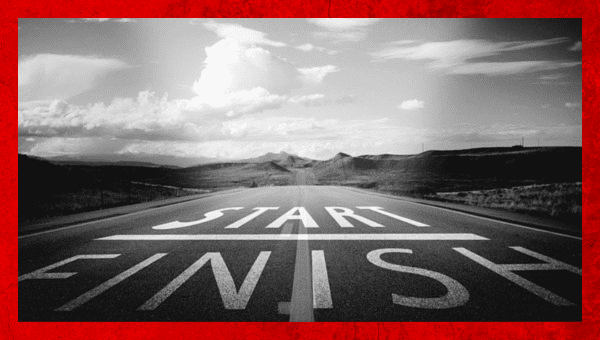Give me a steadfast spirit, Lord.
Endurance. In it for the long haul. Every one of us can recall a goal we worked towards that caused much discomfort in the process. It could be training an entire year for a big race. Or a project at work that took long days and nights, and every ounce of energy to accomplish. It may be several years of sleepless nights working and going to school to get that degree, or working two jobs so someone else can complete their education. It could be pushing through a family illness until healed, or accompanying someone through a terminal illness until death. These situations are exhausting physically, psychologically, and often spiritually. Yet we are created to push through with a steadfast spirit to the end.
How difficult it is, however, to do so with our spiritual life in everyday living, especially in times of desolation. We wilt and give in! Forget being in it for the long haul; we have trouble pushing through just for a day! I’ve often wondered why is that? Perhaps in part, it is because we can’t envision the goal. Jesus says, “I in Him and Him in me.” … what does that really mean to me? The spiritual life can’t be known until experienced; we can’t understand relationship with God until we’ve lived it. And by nature, we are created to instinctively be cautious about the unknown for our own self-preservation. So it is difficult to be like the saints and persevere in our prayer life.
If we can’t wrap our heads around the goal, then we also can’t control it. And perhaps this is the most difficult barrier of all, also an outcome of our innate self-protectiveness. We choose to engage in practices in which we feel some amount of control over the outcomes. We can’t control the spiritual life.
Endurance occurs and progress comes when we take the conversation with God to the next level: surrender. It seems counter-intuitive that to endure one must first surrender and then maintain that posture.
This begins by moving beyond the lament of “I didn’t pray today again—help me pray!” and to the truthful dialogue of “I have no gumption to even try this for you, change me!”. Either prayer is good in itself. However, in the first, I’ve figured out the problem, I’m in control and taking my agenda to Him. In contrast, the second I’m drilling down to the real problem, coming to Him without the solution and surrendering myself for Him to fix me. From the first lament, He might give me the gift of prayer but that won’t necessarily help me to continue trying on my own. In the second approach, He and I can get down to a nuts-and-bolts talk about what’s going on in me. And all-of-a-sudden I realize I’m praying because that’s what prayer is.
To some extent, any person recognizing God’s existence can have this conversation at its surface. God, in His immanent power, is always with each of us. And because each soul is created for union in Him, His Spirit is always beckoning us. However, without the full teaching of the Scriptures given to us by Jesus Himself in the Catholic Church that He established, a person’s knowledge of God remains mitigated which then affects how they relate to God. Meanwhile, without the Holy Spirit infused into their soul, they are trapped within their own natural ability to live a virtuous life. They miss out on experiencing a life of true interior goodness beyond that which is psychologically comforting.
“How God works in the pure soul is nobler than all the works that God ever worked in time and eternity.” Rev. John Tauler, 14th cent.
We all have beautiful souls in our life who endeavor to make the world a better place to the best of their ability. We thank God for the actual grace He gives to make that happen, and for the natural goodness He has given each of us. The old Greek adage of “you don’t know what you don’t know” comes into play here. These souls have an innate desire for that which we’ve been given in our Catholic faith but do not know what this is unless we share it with them.
This is why baptism matters. It gives the soul the capacity to receive and engage with God in a manner otherwise not possible. God infuses Himself into our spirit-soul; the non-baptized do not have God infused within. It is the means God Himself gave us to impart Faith, Hope, Love and His Gifts of Wisdom, Understanding, Counsel, Fortitude, Knowledge, Piety and Fear/Awe of the Lord. Just like our non-baptized friends, we do our best to use our natural virtues to bring goodness to the world around us. The difference is that, when we make this our habit, the infused virtues kick in and bring supernatural effects beyond our ability. The baptized soul is no longer limited to its own nature. It has a supernatural capacity. With persistence that comes out of personal prayer, the seven Gifts grow. We begin to have ‘eyes to see/ears to hear’ as we hear Jesus speak of so often in the Gospels. We are given God’s perspective because more of Him is literally within us.
Our Catholic baptism is that which was instituted by God Himself, baptizing Jesus with water and in the presence of all 3 persons of the Trinity. Jesus reiterates it in MT 28:19. The apostles were sent out to baptize all they meet, not just the men nor just the adults. This is implied in the Gospel and we later see in Acts that this is precisely how the apostles evangelized: baptizing entire households. Knowing that baptism not only sets the soul aside as Holy but also is the door opener to this union with God, why wouldn’t He want babies and children baptized? We should too.
All sacraments, including baptism, are intended to lead us to the Eucharist. The interpenetration of Jesus within our soul completes our baptism. The honest prayer I mentioned above disposes us to fully receive this effect. The outcome over time is that steadfast spirit, the supernatural fortitude to go forward following God’s will.
Image courtesy of Pixabay.




